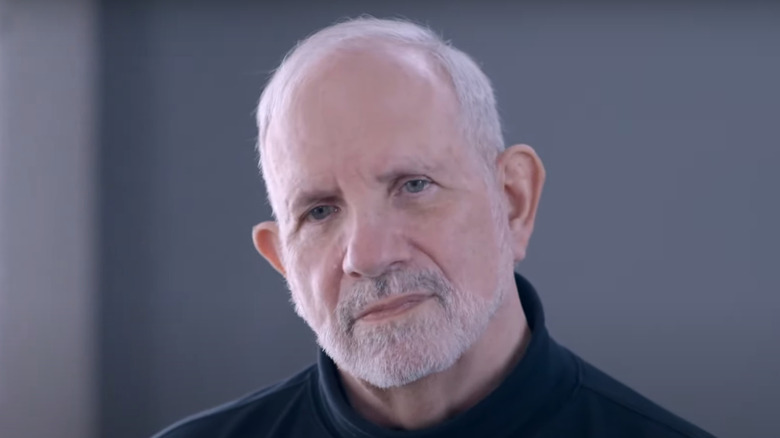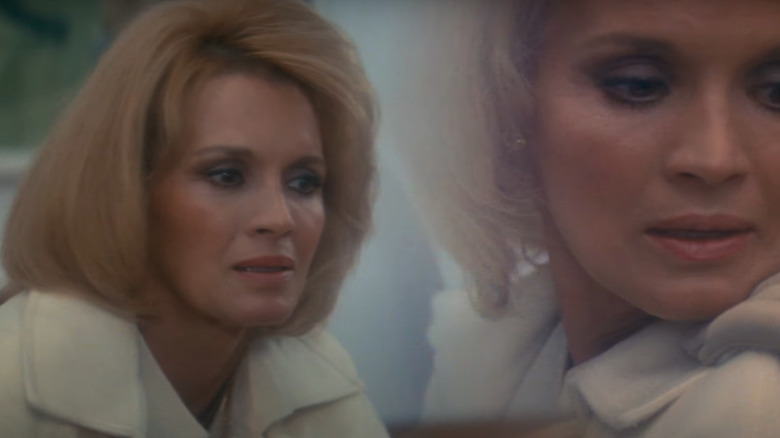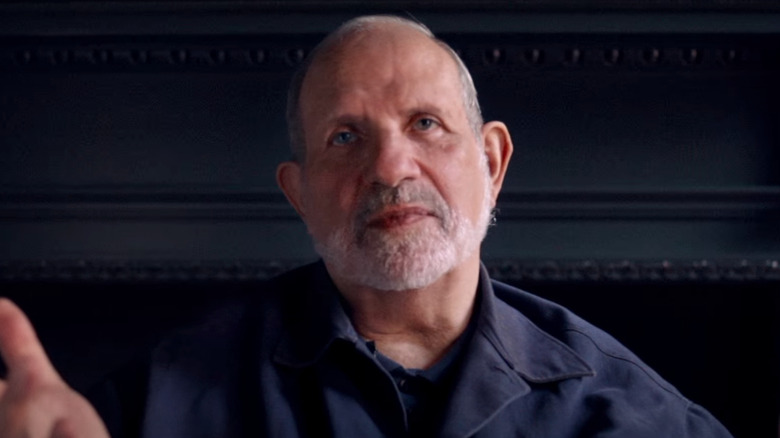Brian De Palma Doesn't Think It's Very Fair To Compare Him To Alfred Hitchcock
Brian De Palma has a reputation as a "Hitchcock conversationalist." Depending on who you talk to, the director has either stolen his entire directorial style, borrowed his cinematic language, or evolved his own style based loosely on the teachings of his celebrated predecessor. Either way, Brian De Palma really likes Hitchcock and everyone noticed a long time ago.
The "Mission: Impossible" director hasn't always played down the comparison, either. Back in 1978, he spent a good deal of his time on the Dick Cavett show extolling the virtues of Hitchcock. Asked why he's the "master," De Palma explained: "Hitchcock pioneered a whole type of film grammar. He taught us how to express things as clearly, visually, I think as they can be expressed." Whatever else people say, clearly the two directors at least share a connection. De Palma literally considers Hitchcock the master, going on to tell Cavett that he's "very much tried to look through [Hitchcock's] eye" and that "if you want to know anything about cinematic storytelling, he's it."
All of which makes it a little weird that the director who gave us Hitchcock-esque suspense thrillers with movies like "Dressed to Kill" doesn't really like it when you compare him to ... the master of suspense.
De Palma loves Hitchcock but not Hitchcock comparisons
What's that? Yeah, Brian De Palma, who claims that Hitchcock wrote the book on cinematic storytelling and gave him a directorial eye through which to look, doesn't want to be too closely associated with Hitchcock. At least, he doesn't want people to view his films through the very lens he claims to have looked through to make them.
As early as August 1980, when New York Magazine spoke with De Palma about "Dressed To Kill" — widely considered an homage to Hitchcock's "Psycho" — the director was pushing back on the comparison. The article in question, by David Rosenthal, highlights the fact that some viewed De Palma as "scattering his movies with visual quotes from famous films, especially Hitchcock," before putting the question to the man himself. Clearly, De Palma wasn't too impressed, retorting that "People sometimes address their interviews to what is like Hitchcock in my movies as opposed to what is De Palma that isn't Hitchcock."
The "Mission Impossible" director also made sure to point to his usage of "forms like split screens or slow motion" which Hitchcock did indeed eschew in his own filmmaking. But the main point for De Palma was that Hitchcock is like what the Simpsons is to animated sitcoms. With the 7th episode of its 6th season, South Park pointed out how when it came to writing comedy, no matter the plotline "The Simpsons Already Did It." In the same way, De Palma views Hitchcock as the originator of, apparently, everything movie-related: "Hitchcock thought up practically every cinematic idea that has been used and probably ever will be used in this form. But I'll take the grammar wherever I can get it."
The grammar of cinema
In his defense, De Palma is making a reasonable point about how Hitchcock — he's such an important director that it's very hard to escape his influence. All creatives have their inspiration before ideally moving from imitation to emulation, and hopefully finally arriving at innovation. Evidently, De Palma considers himself to be firmly in the latter category, telling Cavett back in '78: "I've evolved a kind of grammar of my own." Fair enough.
If you ask Quentin Tarantino, who might be one of the biggest De Palma fans in existence, he'd agree that his hero did indeed innovate on Hitchcock's "grammar" to the point of creating his own style. As Tarantino puts it, De Palma was, unlike Hitchcock, able to push the focus on violence further and "explore the artistic minutiae of the set pieces" while maintaining a "social satire" throughout his career.
Whatever your take, it seems that De Palma's concept of cinematic grammar is at once helpful and not. If Hitchcock had done everything as De Palma claims, then wouldn't all directors be faced with the same critique of borrowing from him all the time. If De Palma is, presumably like every other director, just making movies, which by his definition have all been done before by Hitchcock, why is he the only one that's been haunted by the consistent Hitchcock comparisons?
I think, along with numerous other directors like Orson Welles, Hitchcock did provide a crucial grammar for film-making. But De Palma seems to have a somewhat myopic view of it as the only cinematic grammar and spent much of his career attempting to recreate it in order to evolve it. None of which is a bad thing. It just makes his despair at the Hitchcock comparison that much more confusing when he could just own it.


